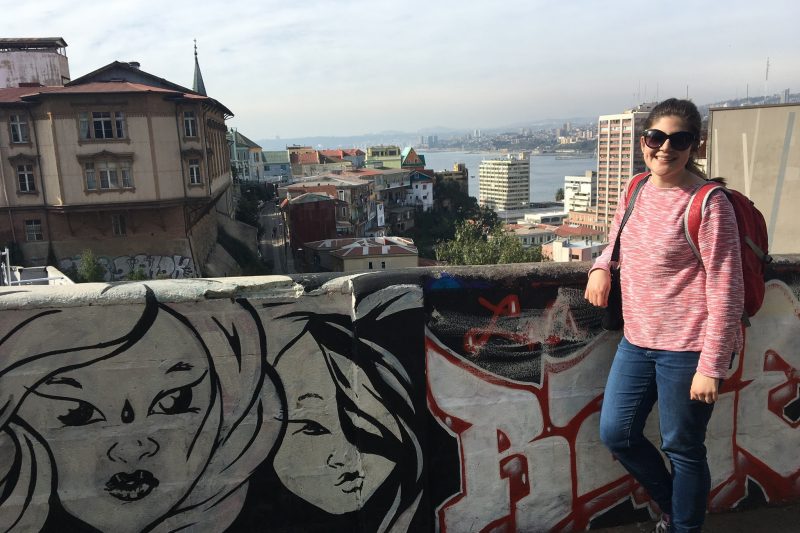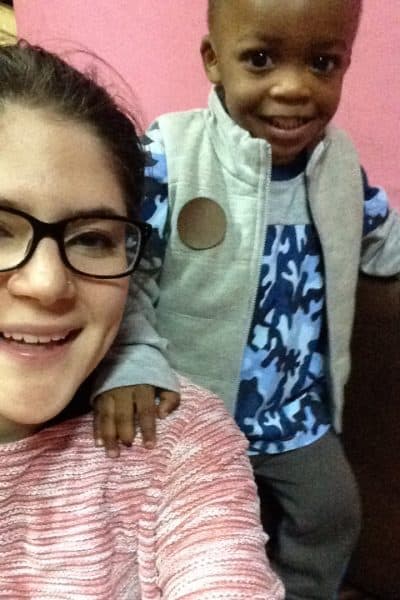Language and Life Lessons in Chile Alex Meilech '18 spent the summer in Santiago, Chile, learning the language, exploring the culture, and caring for the people of the country.
“W&L values an education that not just teaches us chemistry facts or a country’s history, but also that we should all be lifelong thinkers.”
Hometown: Phoenix, Arizona
Majors: Chem-Engineering, Anthropology, Pre-Med focus
Q. What were you up to this summer?
I was in Santiago, Chile for the summer, where I stayed with a Spanish-speaking host family and interned at the Fundacion Santa Clara, a care center for children with HIV. I cared for children ages 2 months to 19 years old, many of whom have other serious issues, such as Down’s syndrome and cerebral palsy. I accompanied them to doctor’s appointments at the public hospitals. I worked four days a week, which left me time to meet people, explore the city, and travel throughout Chile.
Q. How was Santiago?
It was an amazing, vibrant, bustling, exciting, modern city. One of my favorite parts was the ease of transportation: both within the city and throughout the country. Public transportation is so efficient within the city and people make good use of it: the metro (subway) and micro (bus) cover the city extensively, and are reasonably priced. I could go to and from work easily, go back into the center of the city to take advantage of the abundance of museums, malls and movies, great restaurants, and, of course, time with friends. There are hills such as Cerro San Cristobal in the middle of the city, great to run, bike, hike, trolley, or cable car to the top and take in the view of the tallest building in South America.
Also, Santiago is well located within the center of the country to travel throughout the country: an hour and a half by bus to the beach to the west and even closer to the snow and Andes Mountains to the east. I took a weekend trip by a quick plane trip to the Atacama Desert, where I saw sand dunes, salt caverns, a flamingo lagoon, and a frozen lake with 70mph winds all in two days. To sum it up, Chile has everything at one’s fingertips.
Q. What did an average day for you look like?
I woke up and had some breakfast with tea, which is by far the most popular beverage here – someone offered me a tecito (little tea) multiple times a day. When I arrived at to work, I was greeted by the smiling faces of toddlers and babies, and I passed the day taking care of the kids. When the older kids came from school, I’d play with them, teach them a bit of English, and help with their homework. Probably our favorite activity is endless Zumba on YouTube to popular reggaeton music: the Justin Bieber version of “Despacito” was the song de vogue for teens around the world.
I frequently accompanied the children to doctor’s appointments across the city, which could take a while, as appointment times are not as strict as within the U.S. and the public hospital system is inefficient. On my way home, I occasionally (frequently?) stopped for a sopapilla from a street cart, the quintessential Chileno street food: deep fried pumpkin and flour dough with garlic sauce as the classic garnish. I was fortunate that my work was right across from the largest market in the city, La Vega, and while Santiaguinos and visitors frequently took trips to sample the food stands and fresh fruits and vegetables, for me it was a quick walk. At night, I had dinner with my host family. We had fun chatting, and I got to practice my Spanish while eating delicious homemade Chilean food (vegetarian version for me) and providing entertainment for my host family with many amusing misunderstandings.
Q. What was the most rewarding and fulfilling part of the experience?
I learned a lot from my internship. Seeing how a private organization fills the gaps that the overwhelmed public social system leaves was a valuable experience for me as a future doctor, and as someone who just wants to see how the world works. HIV is very stigmatized in Chile, as it is in the U.S., and these children face a lot of other challenges, as the home is in a very poor area of the city. A lot of the children come from backgrounds where their parents are unable to take care of them due to drug/alcohol abuse, poverty, and health problems. Bonding with these kids, who really just want to lead a normal life: make friends, play games, cuddle with Tia Ale (Aunt Alex), reminded me of what’s at stake around the world when we think and talk about equitable healthcare and social services.
Q. What was the biggest challenge you faced?
Not speaking the language fluently can be hard. I came in with a good amount of conversational Spanish, and due to this immersive experience, my Spanish studies progressed rapidly. My host family and especially my host sisters, who were my age, were very patient and accommodating in slowing their pace slightly to talk to me. Still, I frequently became frustrated and just wanted to tell everyone, “I promise I’m very smart in English!” However, becoming bilingual in the future is worth the struggle.
Q. What have you learned at W&L that helped you in this endeavor, and what will you bring back to your life on campus?
I’m very glad to have taken a Spanish class with Professor Michelson, and done Spring Term Abroad 2015 in Argentina with Professor Pinto-Bailey. I can’t put into terms how much having a base of Spanish language makes learning new Spanish so much easier. And the way that my SOAN classes have taught me to think critically and stretch my mind is invaluable for being in brand new situations – I think I can take whatever comes at me and have a great time. I’m definitely going to bring back a new understanding and respect for other cultures and a further willingness to go outside of my comfort zone.
Q. Has this experience impacted your studies or future plans in any way?
I have a new international perspective of the health challenges facing people on the fringes of society, allowing me to look at healthcare in the United States with a new lens, and giving me a better idea of the kind of doctor I want to be in the future: someone who works in medically underserved communities. I also now want to really double down on my Spanish studies and be fluent soon, especially in medical Spanish.
Q. Why is this kind of experience important to W&L students?
I think the best part of W&L is the liberal arts values: W&L values an education that not just teaches us chemistry facts or a country’s history, but also that we should all be lifelong thinkers. I think being abroad in a non-English-speaking country makes me flexible and broadens my horizons immeasurably. With our world being more connected than ever, it’s so important to be cognizant of what is unique and common to other cultures, and to be able to examine our own norms and values with a discerning eye.
Q. Describe your summer adventure in one word:
Magical
Q. What else do you want people to know about your experience?
The Johnson Opportunity Grant and Center for International Education Summer Internship Funding Grant funded this trip for me – many thanks to all the donors for making these experiences possible for me and others!
If you know any W&L students who would be great profile subjects, tell us about them! Nominate them for a web profile.
 Alex Meilech ’18 spent the summer in Santiago, Chile, learning the language, exploring the culture, and caring for the people of the country.
Alex Meilech ’18 spent the summer in Santiago, Chile, learning the language, exploring the culture, and caring for the people of the country. The kids are all smiles when Tia Ale (Aunt Alex) comes around.
The kids are all smiles when Tia Ale (Aunt Alex) comes around.
You must be logged in to post a comment.